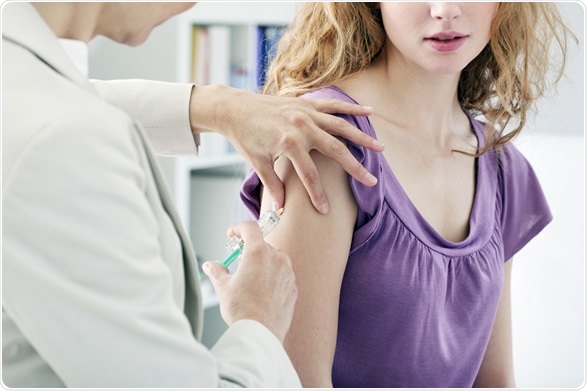Research has shown that human papillomavirus (HPV) vaccination is not associated with increases in sexually transmitted infections (STIs).
Although HPV vaccination can prevent cervical, vulvar and vaginal cancers that are caused by certain HPV strains, take-up of the vaccine remains low. In 2013, 57% of 13-17-year-old girls had received at least one dose, and only 38% had received all three recommended doses. This is partly due to concerns that HPV vaccination may promote unsafe sexual activity by lowering perceived risks of acquiring an STI. Since around a quarter of females aged 14-19 years and 45% of those aged of 20-24 are affected by HPV, it was important to try and allay such concerns.

Image from shutterstock.com
Researchers reviewed STI and HPV vaccination rates among teenage girls from 2005 to 2010 in a large insurance database. By the end of 2010 vaccination uptake was 27%, compared with only 2.5% at the end of 2006. The study included 21,610 females who were vaccinated against HPV and 186,501 matched females who were not vaccinated.
The study showed that females who were vaccinated had higher rates of STIs than those who were not vaccinated both before (4.3 per 1,000 vs. 2.8 per 1,000) and after (6.8 per 1,000 vs 4.2 per 1,000) HPV vaccination was introduced. Since the difference between the groups in the likelihood of contracting an STI did not differ before and after the introduction of the HPV vaccine, HPV vaccination was not associated with an increase in STIs.
Anupam Jena, the study author, commented "Since this is one of the few medications ever developed that can actually prevent cancer, it's good to be able to reassure parents, physicians and policymakers that the vaccine does not promote unsafe sexual practices among girls and young women".
Furthermore, HPV vaccine is most effective when given before sexual activity begins, yet parents and/or physicians may be reluctant to discuss HPV vaccination in case it will be seen as a tacit approval for sexual activity. Dr Bednarczyk emphasises that further steps are required to address concerns of anxious parents, "...development and delivery of information relative to all key partners (adolescents, their parents and their health care professionals) will be critical in removing the stigma of HPV vaccine in our efforts to fully use this vaccine".
Sources:
Bednarczyk RA. Human Papillomavirus Vaccine and Sexual Activity How Do We Best Address Parent and Physician Concerns. JAMA Intern Med. 2015. Epub ahead of print. Available at: http://archinte.jamanetwork.com/article.aspx?doi=10.1001/jamainternmed.2014.7894
Jena AB, et al. Incidence of Sexually Transmitted Infections After Human Papillomavirus Vaccination Among Adolescent Females. JAMA Intern Med. 2015. Epub ahead of print. Available at: http://archinte.jamanetwork.com/article.aspx?doi=10.1001/jamainternmed.2014.7886